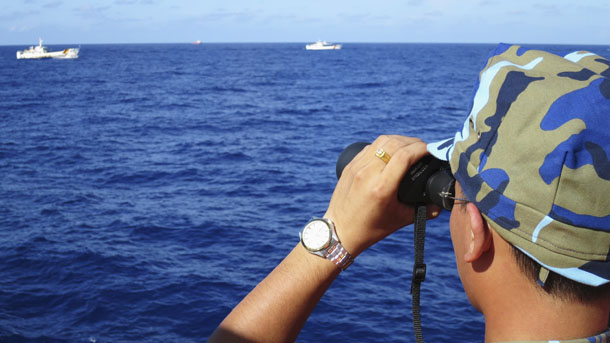SHANGHAI/HANOI — A Chinese oil rig has finished drilling near the disputed Paracel islands in the South China Sea after finding signs of oil and gas, a top Chinese energy firm said on Wednesday, more than two months after its deployment hurt ties with Vietnam.
Vietnam’s coastguard said the $1 billion deepwater rig was being moved toward China’s southernmost island province of Hainan. China’s official Xinhua news agency said it would be relocated to an area off Hainan but gave no details or a date.
The rig’s relocation could reduce tensions between the two neighbors and will also likely be welcomed by Washington, which has accused China of “provocative” actions in the disputed South China Sea in recent months.
Hanoi has said the rig was in its 200-nautical-mile exclusive economic zone and on its continental shelf. Beijing has said it was operating completely within its waters around the Paracel islands, which China occupy.
China National Petroleum Corporation (CNPC), the dominant oil and gas producer in China, said in a statement the rig “smoothly completed” its drilling on Tuesday and found signs of oil and gas. The next step would be to analyze the geological data and evaluate the layers of oil and gas, it said.
CNPC’s preliminary analysis showed “the area has the basic conditions and potential for oil exploration, but extraction testing cannot begin before a comprehensive assessment of the data,” Xinhua quoted Wang Zhen, deputy director of the CNPC Policy Research Office, as saying.
China had previously said the rig was scheduled to explore the waters around the Paracels until mid-August. It was not clear why it had finished one month ahead of schedule, although Xinhua said July was the beginning of the typhoon season.
Admiral Ngo Ngoc Thu, chief of staff of the Vietnam coastguard, told Reuters by telephone the rig was about 30 nautical miles from Triton island in the Paracels and had been moving toward Hainan since late on Tuesday night. Thu said Vietnamese boats were still watching the area closely.
Deployment of the rig on May 2 set off deadly anti-Chinese riots in Vietnam, while scores of Vietnamese and Chinese ships have regularly squared off around the platform. There have been several collisions.
A Reuters reporter on a Vietnamese coastguard vessel on Tuesday witnessed a group of Chinese ships chase the Vietnamese boat away from the area in what has been a near daily cat-and-mouse routine.
The rig is owned by state-run China National Offshore Oil Company Group (CNOOC Group), parent of flagship unit CNOOC Ltd.
Potential for Production
China claims 90 percent of the South China Sea. Vietnam, the Philippines, Malaysia, Brunei and Taiwan also claim parts of the waters, whose estimated energy potential varies widely.
Discoveries near the coasts of Southeast Asian countries in recent years have been mostly natural gas, reinforcing the belief among geologists and explorers that there is more gas than oil in the South China Sea.
Chinese industry experts have said the rig had a good chance of finding enough gas to put the area into production. That would give China its first viable energy field in the disputed South China Sea, as well as make it a source of friction with Hanoi for years to come.
The world’s largest energy user imports nearly 60 percent of its oil needs and more than 30 percent of its natural gas.
In a 2013 report, the US Energy Information Administration, a government agency, said geological evidence suggested the Paracel islands themselves did not have significant potential in terms of conventional hydrocarbons.
However, the chance of making a major gas discovery near the islands was high because there had been several gas finds already in the area, experts have said.
Vietnam has two fields to the left of where the rig had been stationed, much closer to its coast, where US giant Exxon Mobil Corp discovered oil and gas in 2011 and 2012.
Some energy production is taking place in the South China Sea but deepwater areas remain untapped, largely because tensions between rival claimants have made oil companies and private oil service companies reluctant to explore contentious acreage well away from sovereign coastlines.
Additional reporting by Reuters reporter Ben Blanchard in Beijing.

















